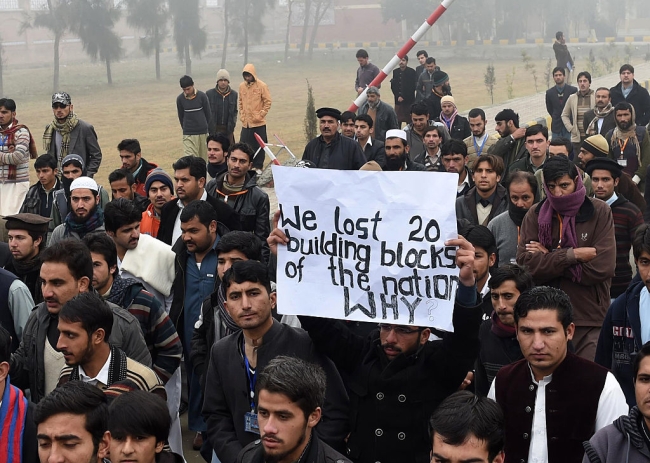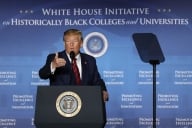You have /5 articles left.
Sign up for a free account or log in.

Pakistani students protest attack on Bacha Khan University.
A Majeed / AFP / Getty Images
A report released today by the human rights monitoring group the Scholars at Risk Network documents a range of recent attacks on international higher education, including militant attacks on university campuses in Afghanistan and Pakistan; targeted killings of scholars in Bangladesh, India, Iraq and Syria; pressures on student protest movements in Myanmar, South Africa, Thailand, Venezuela and elsewhere; as well as cases of persecution and imprisonment, travel restrictions, and loss of academic positions or expulsion from study involving individual scholars and students.
The second installment of “Free to Think: Report of the Scholars at Risk Monitoring Project” is based on an analysis of 158 reported attacks in 35 countries that occurred between May 1, 2015 -- when the group's first report left off -- and Sept. 1. It includes special sections on Egypt, where, the report states, “thousands of students and hundreds of scholars imprisoned prior to this reporting period remain in prison, many for peacefully exercising their right to free expression and association,” and Turkey, where pressures on academe have escalated since a July 15 coup attempt.
“Although these incidents may differ by target, type of attack, location and scale, they are part of a single global phenomenon of increasing attacks on higher education, a crisis marked by widespread violence and coercion to silence inquiry and discourse,” the “Free to Think” report states.
“The big takeaway that’s in the recommendations in the report is all of us need to work on reinforcing a universal norm that ideas are not crimes, that dissent is not disloyalty,” said Robert Quinn, the executive director of Scholars at Risk.
Types of attacks identified in the report include:
- Violent attacks on university campuses, including a militant attack on the American University of Afghanistan on Aug. 24 that killed 15 people, and a Jan. 20 attack on Pakistan’s Bacha Khan University that killed 22 people and responsibility for which was claimed by a Taliban official. The report also describes an October 2015 bombing at the University of Aden that happened after ISIS fighters reportedly issued a threat against the campus, demanding that it be segregated by sex, that music be banned and that students pray collectively.
- Targeted attacks against individual scholars, including the August 2015 public execution of a Syrian antiquities scholar, Khaled al-Asaad, after he reportedly refused to provide ISIS militants with the location of hidden artifacts. The report also details three cases in which scholars or students were killed, two in Bangladesh and one in India, in what the report describes as “apparently targeted attacks connected to their religious views.”
- The crackdown on the higher education sector in Turkey that began in January with criminal and university-level disciplinary investigations of more than 1,000 academics accused of spreading "terrorism propaganda" for signing a petition opposing military operations against Kurdish rebels in the country’s southeast. Many signatories of the petition were in various cases detained or forced from their academic positions. The crackdown accelerated in July after the failed coup that prompted the government to temporarily remove deans, order the closure of 15 private universities and initiate large-scale dismissals and detentions of academics, among others, as part of a widespread purge of individuals deemed to be followers of the Islamic cleric Fethullah Gülen, whom Turkish officials blame for the coup attempt. (Gülen has denied involvement.)
- Ongoing restrictions in Egypt, including the imposition of travel restrictions affecting Egyptian scholars and foreign academics who have reportedly been denied entry to Egypt, purportedly on national security-related grounds. The most high-profile case during the period covered by the report was the kidnapping and killing of Giulio Regeni, an Italian Ph.D. student at the University of Cambridge who was studying Egyptian labor movements. Regeni was kidnapped Jan. 25; his body was found a week later showing signs of torture. “While state authorities claim that he was kidnapped and killed by a gang,” Scholars at Risk's report says, “Egyptian and international human rights defenders suggest Mr. Regeni was targeted by state security forces because of his research.”
- The use of violence, arrest or disciplinary actions by governments or universities to restrict student expression. The report identifies cases in which police or other security forces used violence against student protestors, including in Papua New Guinea, Sudan, Swaziland and Venezuela, as well as cases of arrests or detentions of peaceful student activists in India, Myanmar and Thailand. The report also notes with concern cases in which student protests themselves have turned violent or destructive, as has happened, for example, in the large-scale student protests in support of free higher education in South Africa.
“State and higher education authorities must respect students’ right to engage in peaceful expression and must refrain from violence or other inappropriate responses, especially those likely or intended to provoke violent responses from students,” the report states. “In instances where some students fail to act peacefully and engage in destructive or violent acts, state and university authorities seeking to protect property and other persons should nevertheless exercise restraint and take care to distinguish between violent actors and those students engaged in responsible, peaceful expression.”








